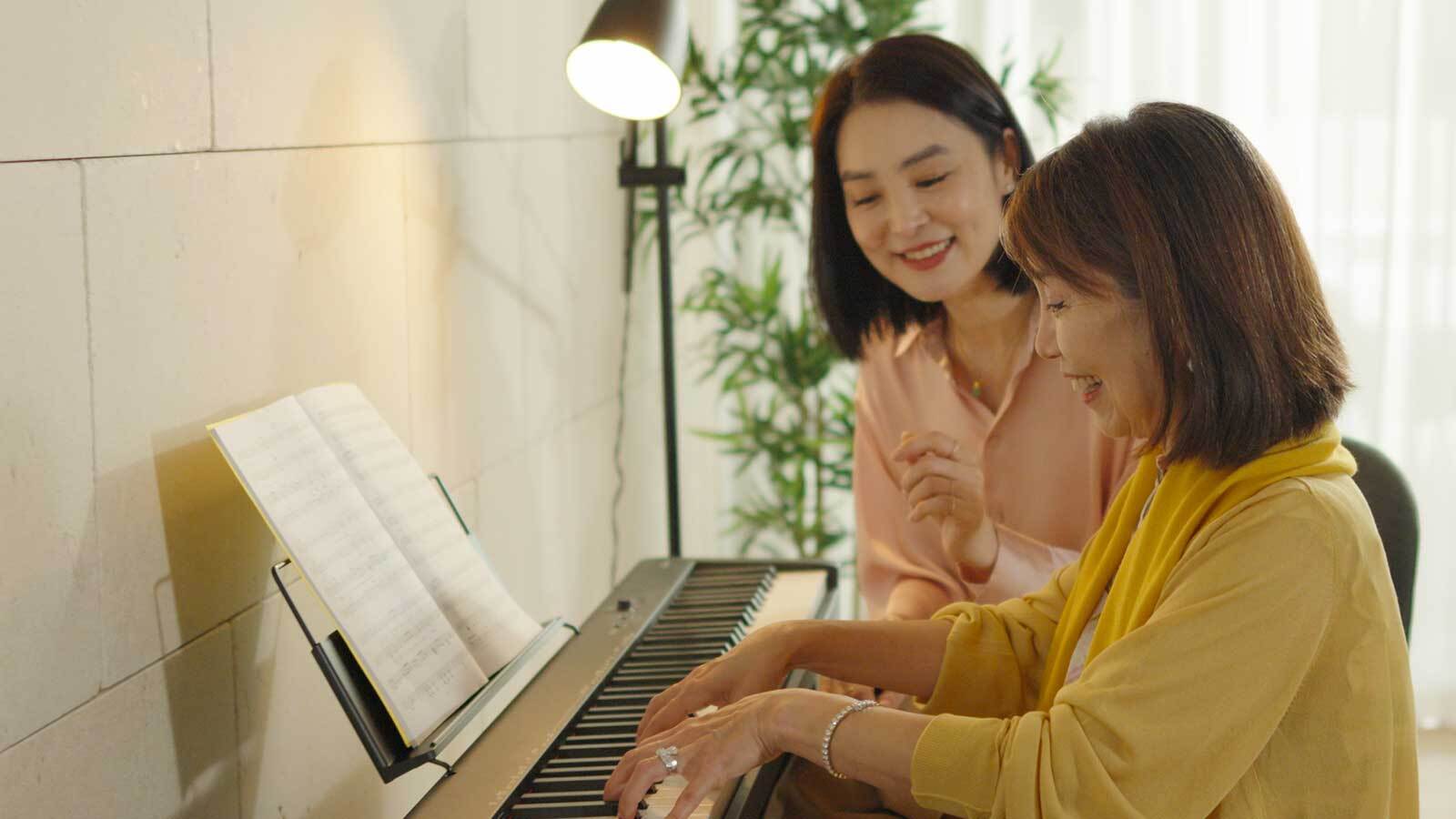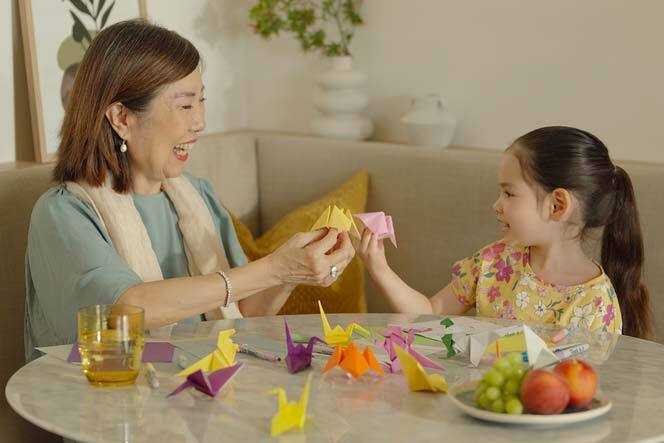
Hearing loss beyond 60
Hearing loss beyond 60
Age-related hearing loss (presbycusis) is the slow loss of hearing in both ears. It's a common problem linked to ageing.7
If you are among the adults that suffer from severe to profound hearing loss, your hearing could decline to a point where even the most powerful hearing aids cannot give your brain the clarity it needs to understand certain sounds.7,12
Hearing loss beyond 60
Age-related hearing loss (presbycusis) is the slow loss of hearing in both ears. It's a common problem linked to ageing.7
If you are among the adults that suffer from severe to profound hearing loss, your hearing could decline to a point where even the most powerful hearing aids cannot give your brain the clarity it needs to understand certain sounds.7,12
Are you experiencing hearing loss?
Are you experiencing hearing loss?
Age-related hearing loss can happen slowly, so you may not notice any significant changes at first.9-10 While wearing your hearing aid(s),
- Do you find noisy environments challenging?
- Do you frequently ask people to repeat themselves?
- Do you turn the volume up to listen to the TV?
- Do you struggle to hear on the phone?8
If you wear hearing aids and answered 'yes' to any of these questions, a cochlear implant system may be an option for you.
Are you experiencing hearing loss?
Age-related hearing loss can happen slowly, so you may not notice any significant changes at first.9-10 While wearing your hearing aid(s),
- Do you find noisy environments challenging?
- Do you frequently ask people to repeat themselves?
- Do you turn the volume up to listen to the TV?
- Do you struggle to hear on the phone?8
If you wear hearing aids and answered 'yes' to any of these questions, a cochlear implant system may be an option for you.
Keep your mind sharp beyond 60
Keep your mind sharp beyond 60
Did you know there has been growing evidence that shows a link between hearing loss and dementia in older adults?14-15
According to research, if you're beyond 60 and have moderately severe to profound sensorineural hearing loss, a cochlear implant may help you to:
- Hear again when your hearing aids are not
enough1-2 - Think, learn and remember better16
- Stay connected16
- Enjoy a better quality of life5
Better hearing may help to keep the mind sharp and help you maintain and improve social interactions1-5, helping you to live life to the fullest, beyond 60.
Keep your mind sharp beyond 60
Did you know there has been growing evidence that shows a link between hearing loss and dementia in older adults?14-15
According to research, if you're beyond 60 and have moderately severe to profound sensorineural hearing loss, a cochlear implant may help you to:
- Hear again when your hearing aids are not
enough1-2 - Think, learn and remember better16
- Stay connected16
- Enjoy a better quality of life5
Better hearing may help to keep the mind sharp and help you maintain and improve social interactions1-5, helping you to live life to the fullest, beyond 60.
How cochlear implants work
How cochlear implants work
A cochlear implant is a small, electronic device that is surgically implanted by an Ear, Nose and Throat (ENT) surgeon. It consists of two parts:
- A sound processor worn externally
- A small implant
Together they capture sounds from the environment and transmit them directly to the hearing nerve, helping to restore clarity, even in noisy environments.1, 17-18
If you're beyond 60 and your hearing aids are no longer enough, then a cochlear implant may help you hear clearly again.1, 17-18
How cochlear implants work
A cochlear implant is a small, electronic device that is surgically implanted by an Ear, Nose and Throat (ENT) surgeon. It consists of two parts:
- A sound processor worn externally
- A small implant
Together they capture sounds from the environment and transmit them directly to the hearing nerve, helping to restore clarity, even in noisy environments.1, 17-18
If you're beyond 60 and your hearing aids are no longer enough, then a cochlear implant may help you hear clearly again.1, 17-18
Funding your cochlear implants
Funding your cochlear implants
Cochlear implants are covered through the public health system and private health insurance (hospital cover).
- MOH subsidizes Cochlear implants for children and adults through public health system for Singaporeans. The extent of subsidy can go up to 80% and will be determined at the restructured hospitals through further assessments of eligibility.
- Private health insurance hospital cover may fund costs associated with cochlear implants. Coverage of the surgical procedure and any hospital costs will depend on your level of insurance.
Contact the Cochlear Care Team today to learn about the funding options available to you.*
Funding your cochlear implants
Cochlear implants are covered through the public health system and private health insurance (hospital cover).
- MOH subsidizes Cochlear implants for children and adults through public health system for Singaporeans. The extent of subsidy can go up to 80% and will be determined at the restructured hospitals through further assessments of eligibility.
- Private health insurance hospital cover may fund costs associated with cochlear implants. Coverage of the surgical procedure and any hospital costs will depend on your level of insurance.
Contact the Cochlear Care Team today to learn about the funding options available to you.*
Find out more about clear hearing
Find out more about clear hearing
If you are struggling to hear clearly, even when you're wearing your hearing aids, contact the Cochlear Care Centre on
6553 3814 or Whatsapp on 9832 4914. You can also download our free information brochure.
Find out more about clear hearing
If you are struggling to hear clearly, even when you're wearing your hearing aids, contact the Cochlear Care Centre on
6553 3814 or Whatsapp on 9832 4914. You can also download our free information brochure.
Please seek advice from your health professional about treatments for hearing loss. Outcomes may vary, and your health professional will advise you about the factors which could affect your outcome. Cochlear implants are for the treatment of moderately severe to profound hearing loss. Always follow the directions for use. Not all products are available in all countries. For Cochlear™Nucleus®, Osia® and Baha® systems: This product is not available for purchase by the general public. Please contact your local Cochlear representative for product information.
The video features actors and should not be interpreted as a testimonial from a recipient. Consult your health professional to determine if you are a candidate for Cochlear technology.
For a full list of Cochlear's trademarks, please visit our Terms of Use page.
*Private health insurers may be able to provide reimbursement of a hearing implant. Coverage of surgical and hospital costs will depend on your insurance level. Contact your health insurance provider or hearing health professional to determine your eligibility for coverage.
References
- Fitzpatrick EM, Leblanc S. Exploring the factors influencing discontinued hearing aid use in patients with unilateral cochlear implants. Trends in Amplification. 2010, 14; (4): 199–210.
- Crowson MG, Semenov YR, Tucci DL, Niparko JK. Quality of life and cost-effectiveness of cochlear implants: A narrative review. Audiol Neurotol. 2017, 22: 236 – 258.
- Völter C, Götze L, Dazert S, Falkenstein M, Thomas JP. Can cochlear implantation improve neurocognition in the aging population? Clin Interv Aging. 2018, 13: 701–712.
- Mosnier I, Bebear JP, Marx M, Fraysse B, Truy E, Lina-Granade G, Mondain M, Sterkers-Artières F, Bordure P, Robier A, Godey B, Meyer B, Frachet B, Poncet-Wallet C, Bouccara D, Sterkers O. Improvement of cognitive function after cochlear implantation in elderly patients. JAMA Otolaryngol Head Neck Surg. 2015, 141; (5):442-50.
- Mosnier I, Vanier A, Bonnard D, Lina-Granade G, Truy E, Bordure P, Godey B, Marx M, Lescanne E, Venail F, Poncet C, Sterkers O, Belmin J. Long-term cognitive prognosis of profoundly deaf older adults after hearing rehabilitation using cochlear implants. J Am Geriatr Soc. 2018, 66; (8): 1553-1561.
- World Health Organisation. Decade of Healthy Ageing Plan of Action. (Internet). Geneva (CH): World Health Organisation (cited February 2023). Available from: https://www.who.int/publications/m/item/decade-of-healthy-ageing-plan-of-action (accessed May 2022)
- Johns Hopkins Medicine, Age-Related Hearing Loss (Internet). Baltimore, Maryland (US): Johns Hopkins Medicine (cited 2021). Available from: https://www.hopkinsmedicine.org/health/conditions-and-diseases/presbycusis (accessed May 2022)
- Access Economics. Listen Hear! The economic impact and cost of hearing loss in Australia. (Internet). Access Economics Pty Ltd (2006), (cited February 2023). Available from https://hearnet.org.au/wp-content/uploads/2015/10/ListenHearFinal.pdf; 35. (accessed February 2023)
- Leo de Raeve, European Association of Cochlear Implant Users EURO-CIU: The relationship between hearing loss and depression, cognition, and dementia
- Raman G, Lee J, Chung Met al., authors; Sen S, editor. Effectiveness of Cochlear Implants in Adults with Sensorineural Hearing Loss [Internet]. Rockville (MD): Agency for Healthcare Research and Quality (US); 2011 Jun 17. Introduction. Available from: https://www.ncbi.nlm.nih.gov/books/NBK285762/
- Croll PH, Vernooij MW, Reid RI, et al. Alzheimers Dement. 2020 Nov;16(11):1515-1523. doi: 10.1002/alz.12151.
- Walling AD, Dickson GM. Hearing loss in older adults. Am Fam Physician. 2012;85(12):1150–56.
- Lin F.R., Yaffe K., Xia J., et al. (2013). Hearing loss and Cognitive Decline in Older Adults.
- International Consensus paper; Buchman et al. (2020) Unilateral Cochlear Implants for Severe, Profound, or Moderate Sloping to Profound Bilateral Sensorineural Hearing Loss: A Systematic Review and Consensus Statements.
- World Health Organisation. World Report on Hearing. (Internet). Geneva (CH): World Health Organisation (cited February 2023). Available from: https://www.who.int/publications/i/item/world-report-on-hearing, (accessed May 2022)
- Mosnier et al 2014. Predictive Factors of Cochlear Implant Outcomes in the Elderly. Audiol Neurotol 2014;19(suppl 1):15–20.
- Runge CL, Henion K, Tarima S, Beiter A, Zwolan TA. Clinical outcomes of the CochlearTM Nucleus® 5 cochlear implant system and SmartSoundTM 2 signal processing. J Am Acad Audiol. 2016, 27; (6): 425– 440.
- Rumeau C, Frere J, Montaut-Verient B, Lion A, Gauchard G, Parietti-Winkler C. Quality of life and audiologic performance through the ability to phone of cochlear implant users. Eur Arch Otorhinolaryngol. 2015, 272: 3685–3692.




